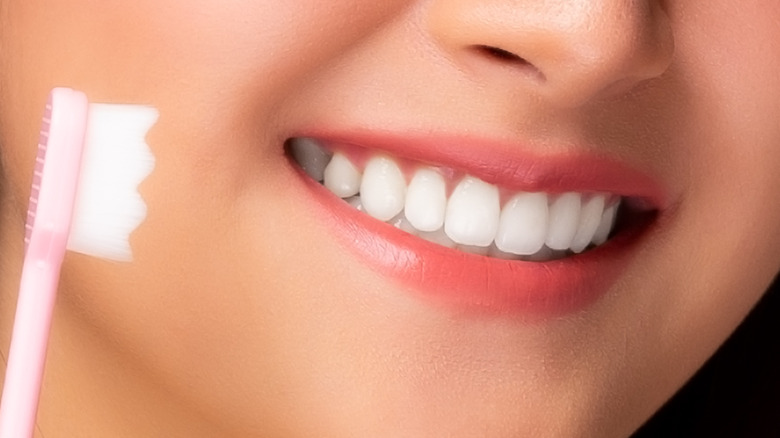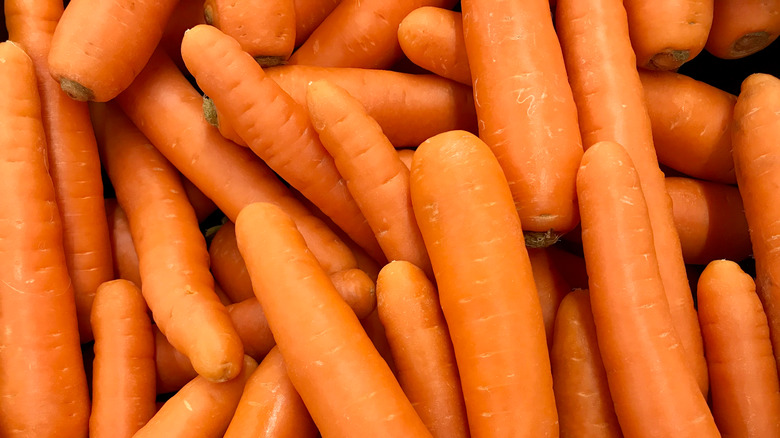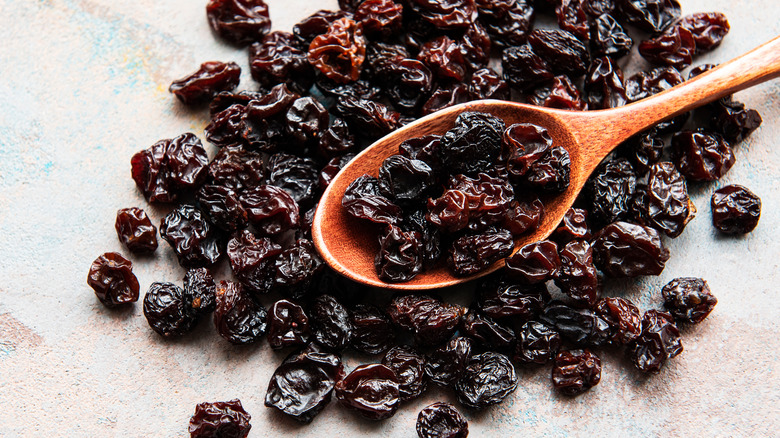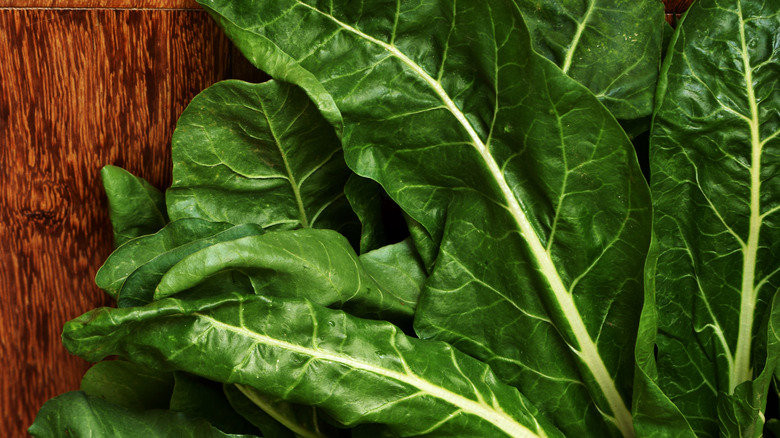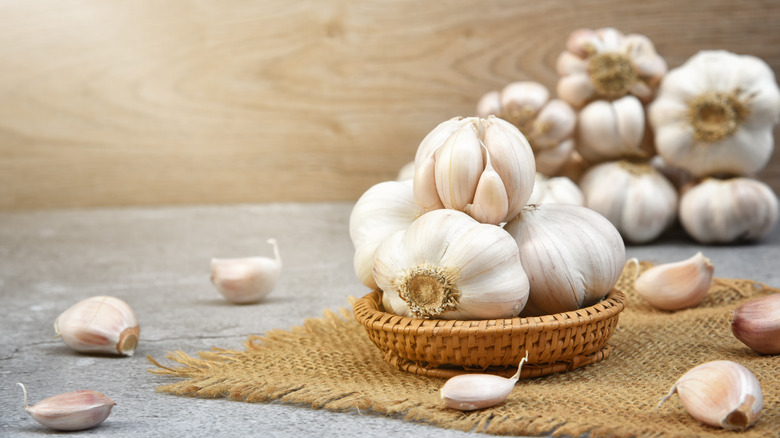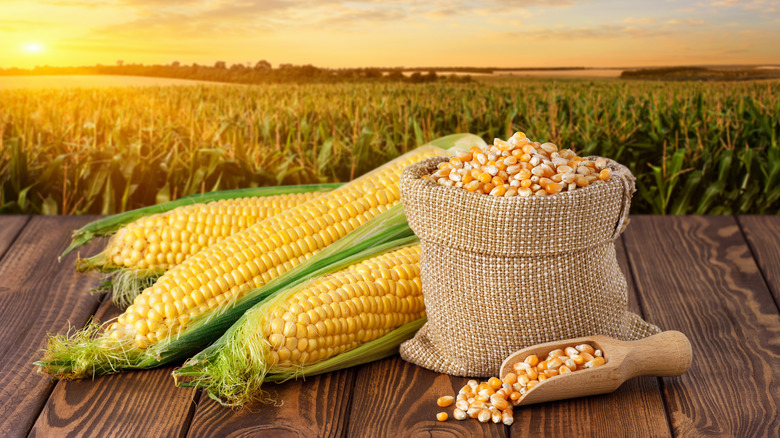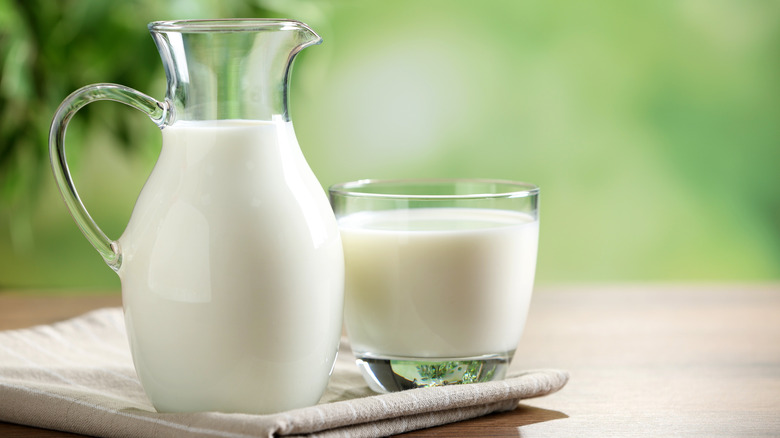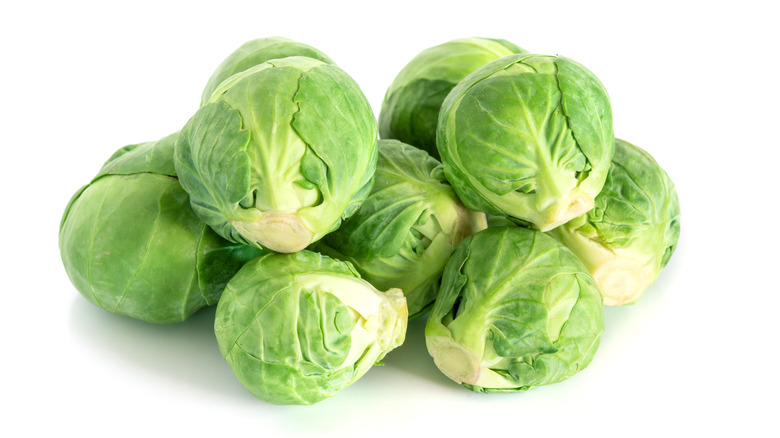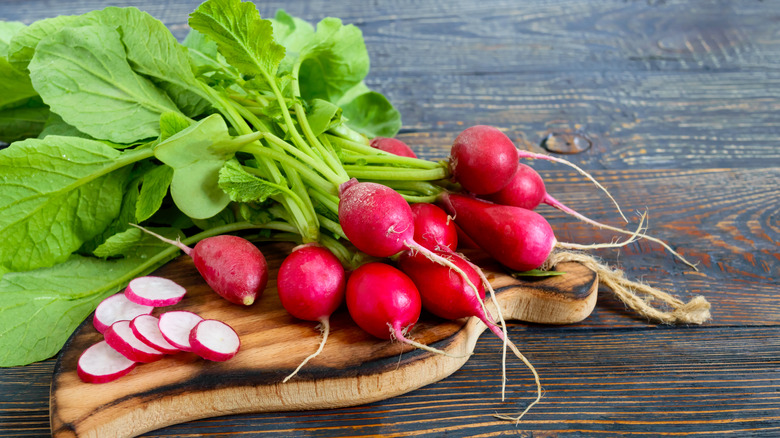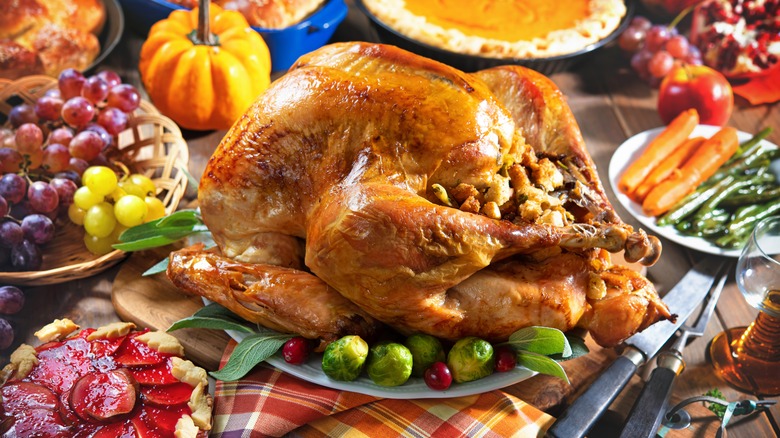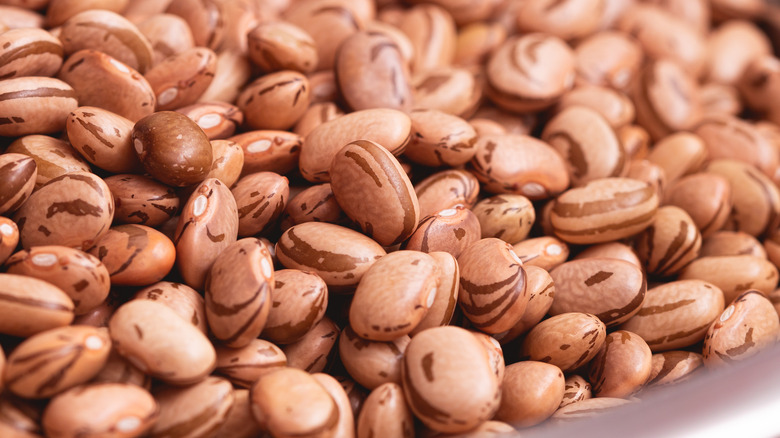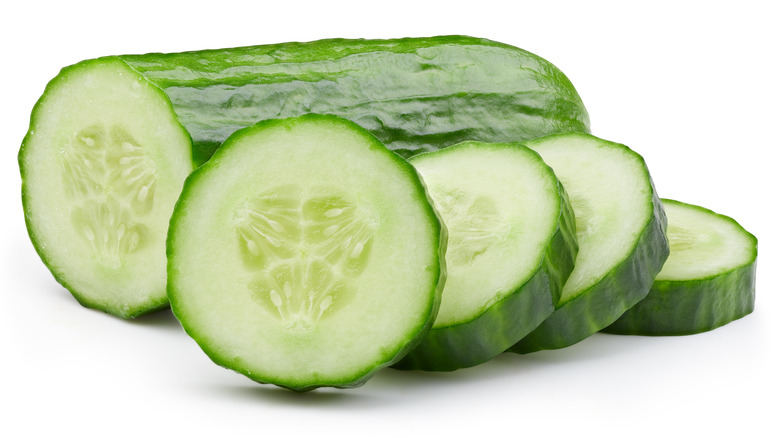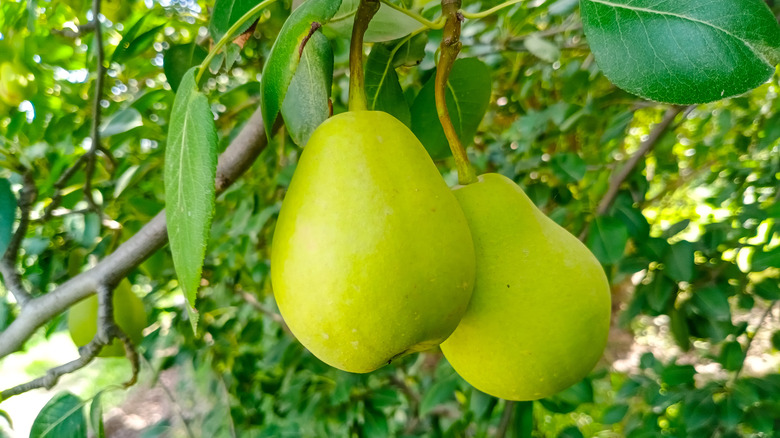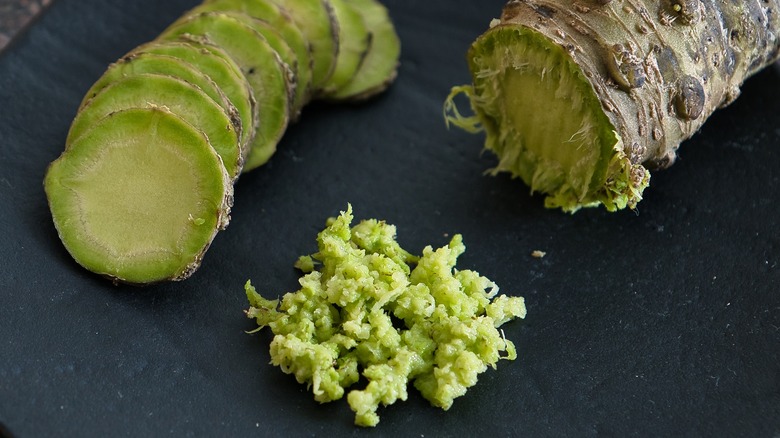Foods That Are Great For Your Teeth
There's something unique about teeth. On the one hand, they serve a very practical purpose. Without them, chewing would be at least difficult, if not impossible. And yet they also help us convey our feelings. Without saying a word, a person can show emotions like happiness and anger by just smiling or gritting their teeth. Yes, our teeth are important to us both physically and emotionally, so keeping them healthy should be a priority.
Before we explore some of the ways different foods could be beneficial for one's teeth, it's essential to understand the basic structure of our chompers. According to the Werschky & Lewis Family Dentistry, a tooth is mainly comprised of four parts. The center of a tooth is made up of a combination of blood vessels, nerves, and tissue known as the pulp. This is surrounded by tissue called the dentin, which is protected by a layer of calcified tissue called enamel. And, yes, if you're experiencing tooth sensitivity, it could be that your enamel is weakened, and so your dentin is exposed. Finally, a hard tissue called the cementum helps protect the root of your tooth.
Of course, the best way to keep your teeth healthy is to exercise good oral hygiene and schedule regular checkups at the dentist. However, certain foods can help by keeping your mouth healthy and/or providing your teeth with crucial nutrients. Nevertheless, always check with your healthcare professionals before making any changes to your diet.
Carrots
Did you know that carrots come in more colors than just orange? As The Spruce Eats explains, these popular vegetables can be red, purple, and even white. But even if you want to stick to the orange variety, raw carrots can be very good for your teeth.
As Dr. Frank Cattanese of Encore Dental of Lacey told Eat This, Not That!, "Foods that are abrasive in nature and have texture to them act like a toothbrush in and of themselves because they get build-up and plaque off the teeth and gums because they're rough when you chew them." In other words, those crunchy carrots can help to keep your teeth cleaner between brushings. Plus, as Dr. Cattanese points out, the sugar content of carrots is low, which is also good for your teeth.
Besides possibly being good for one's teeth, carrots are also little powerhouses when it comes to nutrients, per Healthline. For example, if you have problems managing your blood pressure, carrots are a good source of potassium, a mineral that has been shown to help with blood pressure issues. Carrots also contain vitamin B6, which helps your body get energy from what you eat. In addition, these crunchy vegetables can help you increase your intake of vitamin A. How? Well, your body can turn a substance in carrots called beta carotene into the vitamin.
Raisins
If a dentist said you have dental caries, you probably wouldn't be familiar with that term and so might not be too worried. But as the National Institute of Dental and Craniofacial Research explains, "dental caries" is another way of saying tooth decay. Specifically, this occurs when certain bacteria make the inside of your mouth more acidic — if left unchecked, this can eventually cause cavities, infections, and tooth loss. Now, you might expect sweet foods like raisins that stick to one's teeth would increase the chances of dental caries. However, data has pointed to the opposite possibility.
According to an article in Contemporary Clinical Dentistry, a 2013 study by the USA Department of Food and Nutrition found that five different types of antioxidants in raisins might protect the mouth against tooth decay-causing bacteria. How? Well, one of the possible bacteria behind tooth decay is Mutans Streptococci — and eating raisins might keep this bacterium from sticking to one's teeth, thereby reducing the chances of it leading to cavities and other oral health issues. Another thing to keep in mind is that raisins contain oleanolic acids, which are plant antioxidants that can keep bacteria from growing.
Although this study showed promise for raisins as a way to prevent tooth decay, additional research is needed. With that said, if you do want to add raisins to your oral health-friendly diet, you should be careful about cereals that contain raisins. Unfortunately, these products tend to also have added sugars.
Swiss chard
It may not surprise you to hear that Swiss chard and spinach are related (per MasterClass). After all, both are leafy green vegetables (even though Swiss chard has white stalks), and they have similar flavors. But did you known that Swiss chard is packed with nutrients that could be beneficial for your teeth?
As West Chester Dental Arts explains, Swiss chard is packed with folic acid. And according to Forever Smiles Orthodontics, folic acid helps your teeth by helping your gums. Specifically, this member of the B vitamin family keeps your gums from becoming inflamed. And this is important for two reasons: First, this reduces the chances of plaque building up in your gums, and second, it also lowers the odds of anaerobic bacteria (i.e. bacteria that thrives when not exposed to oxygen, via Medline Plus) accumulating in the gums and causing oral health problems.
In addition to being a good source of folic acid, Swiss chard also contains large amounts of calcium, per West Chester Dental Arts. And as Wright Smiles notes, a crucial component of your teeth's enamel is calcium. Furthermore, Swiss chard is packed with other essential nutrients like vitamins K, C, and A, according to MasterClass. Plus, it's loaded with antioxidants, which can help with managing blood sugar and blood pressure, as well as supporting your immune and digestive systems.
Garlic
Dracula might be known for his sharp fangs, but humans definitely have an advantage over him in the oral health department: garlic. Yes, one of the count's biggest weaknesses can be a great addition for a tooth-friendly diet.
According to Johnson Orthodontics, our mouths are teeming with both good and bad bacteria. Yes, you read that right. Bacteria isn't always bad, but the strains of it that are can cause gum disease and tooth decay. However, garlic contains a compound called allicin, which could help prevent bad bacteria from growing and multiplying while not harming the good bacteria your mouth needs. This is because allicin has antibacterial properties. But that's not all. Because of allicin, garlic could also help your body defend against viruses and fungi.
However, there is one small thing to keep in mind: While garlic can be good for your teeth and gums, allicin is what causes the infamous garlic breath. So, it's important not to skimp on your oral health routine like gargling with mouthwash. However, don't let its pungent nature discourage you. Research has shown that besides possibly being good for oral health, garlic might also improve immune system function. Plus, it's a natural low-calorie food that's easy to incorporate into a meal plan.
Whole grains
As their name suggests, whole grains are just that — the entire grain. In other words, unlike other grain products that remove parts like the bran, whole grains are processed differently, allowing them to keep these parts (via Mayo Clinic). Because of this, whole grains don't lose nutrients and fiber, making them potentially healthier. And when it comes to your teeth, there's still one more important element whole grains bring to the table.
As Station Dental explains, the bacteria that can cause cavities have an easier time digesting simple carbohydrates than complex carbohydrates. In particular, simple carbs that stick to one's teeth — like the ones found in sodas and sweets, per Distinctive Dentistry — are very likely to lead to cavities and other oral health problems. However, whole grains have complex carbs, which are less likely to cause dental issues (via Station Dental). Also, because of the way they're produced, they usually have a high fiber content and that can rev up how much saliva your glands are producing. And remember, saliva is your body's natural way of washing away potentially harmful substances like bits of foods from your teeth and gums.
So, what are some good whole grain foods on the market? Well, as the Station Dental Group notes, brown rice, corn, and oats are all good choices. So are certain pastas and breads, but you need to opt for the whole wheat varieties. Plus, using whole-wheat flour in your recipes can add more whole grains to your diet (via Mayo Clinic).
Cow's milk
To really understand how cow's milk might be good for your teeth, we need to talk about one of its major components: calcium. As Wright Smiles explains, your teeth need calcium in order to maintain their enamel. However, our bodies don't create calcium, so we need to take it in from outside sources like cow's milk. In addition, cow's milk also contains phosphorus (per Spanaway Dental Wellness), which together with calcium forms a substance called hydroxyapatite (via Delta Dental). And if you want to imagine your enamel without hydroxyapatite, then imagine a brick wall with no bricks.
In addition to helping keep your enamel strong, cow's milk also has caseins, which are proteins that can cover your teeth with a film that makes them more resistant to the bacteria that can cause tooth decay. And while sugary foods can make the inside of your mouth more acidic, cow's milk can change the pH of your mouth. However, as Medline Plus points out, cow's milk does have simple carbohydrates, which can cause problems if they stick to your teeth. So, be sure to brush thoroughly after drinking your evening glass.
Brussels sprouts
Poor Brussels sprouts. They usually get labeled (especially by children) as unappealing vegetables. But as WebMD explains, Brussels sprouts become less appetizing in flavor, scent, and texture when they're cooked for too long (hence, why it's assumed they're not tasty). When done right, they can make a nice addition to your plate not just because of how they taste, but also because of how they can be good for your oral health.
According to Salud America!, Brussels sprouts are a great source of vitamin C, which is extremely important for boosting your tooth health by keeping your gums strong, per Winning Smiles PD. Although teeth have roots, weak gums increase the odds of your teeth not properly staying in place. Fortunately, getting the right amount of vitamin C on a regular basis reduces the chances of your gum line receding. It also cuts down on the odds of your gums becoming swollen and/or bleeding, as well as your likelihood of developing problems like periodontitis and gingivitis.
Besides containing vitamin C, Brussels sprouts also have phosphorus (per Salud America!). And remember, phosphorus helps your body make your teeth's enamel, according to Spanaway Dental Wellness. But although Brussels sprouts can be beneficial for your teeth and gums, you want to steam them instead of roasting them. This is because roasted vegetables tend to be more acidic, which isn't as good for your teeth.
Radishes
If you're a child of the '80s, you probably associate radishes with the "Fraggle Rock" television series, since they were the title characters' favorite food. However, us non-fraggles can also benefit from these crunchy root vegetables (a.k.a. plants that grow under the ground and are safe to consume, per Healthline).
As Sandcreek Dental explains, radishes are excellent sources of vitamin A. And according to Houston's Pediatric Dentist, this vitamin does something that's both beneficial and a little disgusting: It encourages your body to produce mucous inside your mouth. Yes, it might not be something you think about (or want to think about), but mucous acts like protective barrier for you gums and the insides of your cheeks. And without it, you'd have a harder time avoiding, for example, infections happening inside your mouth.
In addition, the vitamin A in radishes can also help the glands in your mouth release more saliva (via Houston's Pediatric Dentist). Again, maybe not the most pleasant thought, but saliva does help to keep particles from building up and damaging one's teeth. Plus, Sandcreek Dental points out that radishes (like other root vegetables) are loaded with water, which is especially beneficial for your oral health since it helps keep your mouth clean. However, as Nutrition Data notes, radishes do contain a decent amount of sugar, so you should keep that in mind if you want to incorporate more of them into your diet.
Turkey
Turkey's have become infamous for the "tryptophan comas" people experience around Thanksgiving. However, if you're concerned about your oral health, you might want to shift your focus from tryptophan to a different amino acid that you can get from turkeys.
As Andersen Dental Center explains, turkeys are packed with the amino acid arginine. And according to researchers from the University of Michigan and Newcastle University, arginine might help your body break apart the plaque building up in your mouth before it has a chance to cause gum disease and cavities. You see, sometimes bacteria stick together and form a coating known as biofilm on your teeth, gums, and the inside of your mouth in general. But arginine might prevent these bacteria from forming biofilms, which reduces the chances of oral health issues.
Now, to be fair, more research is needed, but this data has the potential to change current oral care practices. Currently, products designed to fight plaque do so by destroying all the bacteria in one's mouth. But this can cause a separate set of problems because not all bacteria is bad. Arginine, however, might offer a more targeted way of avoiding the buildup of plaque (via University of Michigan). Now, please don't misunderstand. Just because oral care practices are being examined for possible improvements does not mean you shouldn't use products like toothpaste or mouthwash, especially if they've been recommended to you by your dentist. But eating arginine-rich turkey might give your mouth another tool to ward off cavities and gum disease.
Beans
In the story of "Jack and the Beanstalk," Jack sells his cow for some beans, which eventually grow into a huge beanstalk. However, if Jack had realized how good beans can be for one's teeth, he might have held onto a couple of them for dinner.
Before we go any further, let's clear up one thing. Beans are part of the legume family of vegetables, per WebMD. And like all legumes, beans are packed with both calcium and magnesium, both of which are crucial for your teeth, according to dentist Michael G. Landy's website. Remove either of these minerals from the equation, and your body won't be able to properly form and maintain the protective enamel on your teeth. These are also important nutrients for your bones, specifically to maintain their strength and density. And if you're thinking, "Okay, but this is an article about my teeth not my bones," remember, your teeth are connected to your jawbone.
On top of containing calcium and magnesium, beans are also known for helping to defend the body against bacteria, including the kind that can lead to oral health problems like tooth decay (via Lakeview Dental Care). This is because beans are rich both in nutrients and antioxidants. However, as WebMD explains, beans also contain substances known as antinutrients, which can interfere with your body taking in nutrients like calcium, phosphorus, and magnesium. Exercising good portion control and eating a variety of foods can help to offset this aspect of beans.
Cucumbers
Did you know that cucumbers are related to both melons and squashes? As Medical News Today explains, all three of these foods are part of the Cucurbitaceae family of plants. But when it comes to your teeth, cucumbers are one of the standouts of their family.
According to Newberg Family Dental, eating cucumbers helps the glands in your mouth produce more saliva, which benefits your mouth's health in several ways. First, saliva keeps the inside of your mouth from becoming too acidic. Second, saliva acts as a natural wash for your teeth, so food particles are less likely to stick to them. And third, saliva contains phosphorus and calcium, both of which are important nutrients for your teeth's enamel. But that's not all. The calcium, bicarbonate, and phosphate in your saliva can help repair tooth decay when it's in its early stages, per American Dental Hygienists' Association. And as if that wasn't enough for your saliva to do, it also can help your body fight off the bacteria that can lead to tooth decay and loss (via Houston's Pediatric Dentist).
While cucumbers can help your body produce more saliva, that's not the only possible oral health benefit they bring to the table. They're also rich with water (per Medical New Today). And remember, water in general can help keep one's teeth freer of food particles and other potentially problematic substances. In addition, the American Heart Association states that cucumbers contain another important nutrient for teeth: magnesium.
Pears
Flowering pear trees can be beautiful additions to someone's yard. However, don't sell the fruit of these lovely plants short. Besides being sweet natural treats that are good raw or as part of a favorite recipe, pears can be little powerhouses of benefits when it comes to your oral health.
Now, let's address the elephant in the room. According to Delta Dental, pears do have sugar. However, they also contain large amounts of water, and that does help offset their natural sugar by diluting it. Additionally, the water in pears encourages your glands to make more saliva, which helps wash food particles off your teeth. Also keep in mind that pears have vitamin C, which, as Winning Smiles PD explains, can help keep your gums strong.
Now, you might be thinking, "Okay, but there's plenty of other fruits that have vitamin C." True, lemons and limes are both packed with that nutrient, per Delta Dental. However, pears have a big advantage over these fruits when it comes to your teeth and gums because they are far less acidic. In fact, eating pears can help make the plaque in your mouth less acidic, and therefore less likely to cause cavities and tooth decay.
Water
Of course, we've all heard how beneficial water is for overall health. It's good for multiple areas of your body, including your skin, your muscles, and your endocrine system (just to name a few), per the American Dental Association (ADA). And it reduces your chances of developing cavities and other oral health problems by helping to wash particles from what you eat and drink off your teeth. But to really understand how water is good for your oral health, we need to discuss a mineral you've probably heard mentioned in toothpaste and mouthwash commercials: fluoride.
As Mouth Healthy explains, fluoride can help your teeth's enamel stay free of cavities. When the acidity in your mouth goes up, your enamel can become weakened and susceptible to damage. However, fluoride (in the right amounts) can help your enamel withstand that acid better, decreasing the odds of cavities and tooth decay. This is why regularly drinking beverages like soda, sports drinks, and juices can take a toll on your oral health. These drinks usually contain acids that can damage your teeth. Water, on the other hand, has the opposite effect on your mouth.
And there's still one more thing to keep in mind. While your body naturally produces saliva, some people experience a condition called dry mouth (via ADA). When this occurs, you're more vulnerable to health problems with your teeth. And while dry mouth is something you should talk about with your dentist, water can help protect your teeth before your appointment.
Wasabi
If you've ever eaten sushi, you're familiar with this next food. That spicy green mustard that usually accompanies sushi and sashimi is called wasabi – and as it turns out, this pungent condiment can do you a lot of good if you have oral health concerns.
According to Comfort Dental Care, the bacteria Streptococcus mutans can make one's saliva more acidic and lead to problems like cavities and tooth decay. However, wasabi could help prevent this bacterium from growing and causing such problems. In addition, wasabi is a good source of a number of nutrients that can be good for your teeth, such as calcium (a key component of tooth enamel, per Wright Smiles) and vitamin C (which, as Winning Smiles PD explains, can help keep one's gums strong and so further protect one's teeth).
Besides these possible benefits for one's teeth, wasabi could also be a good addition for your diet if you're worried about osteoporosis (via Healthline). According to J-STAGE, this spicy mustard contains p-hydroxycinnamic acid (HCA), which could help with bone density and regeneration. However, initial research into HCA and osteoporosis has been on animals, not humans, so additional research is needed (per Molecular and Cellular Biochemistry). With that said, you should still speak with your dentist about adding wasabi to your meal plan, especially if you often experience cavities.

